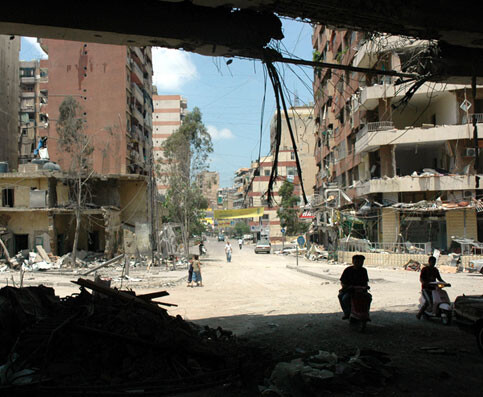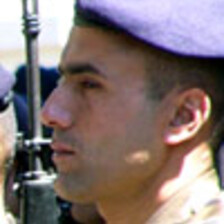Koura 16 July 2006

The aftermath of attacks by Israel on Lebanon 16 July 2006. (Peter Speetjens/IRIN)
Here, in northern Koura, in what feels like a sanctuary, there is relative calm. It is rare to hear the Israeli fighter jets, and perhaps impossible to hear the bombs. If we were to turn off the TV news (which has been constantly on since Wednesday), and not talk to our friends throughout the country, we would think it is just another day. The University of Balamand will be open for work tomorrow. Those who can come to work, and can concentrate, will come. (Our office at the university will be closed, though. More than half of our staff are in Jbeil and Jounieh, and it is simply not worth the risk for them to come to cross the Chekka tunnel, that has been threatened by attack by the Israeli Offensive Forces since last night, to come to the University of Balamand.)
It feels quite different here than in my home town of El Mreijat, “Bawabet el Beqaa” (The Door to El Beqaa). We heard the bombs quite powerfully there. And several times, we felt them. At the sound of the first bomb that hit quite close to our home (a few kilometers away), my cousin’s youngest son, in mere seconds, went from his strong boyish bravado-demeanor to that of a frightened little boy. He threw his ice cream cone away, and got strong stomach pains. At the sounds of the next bomb, he ran and hid under a table. I wondered how the children in the south and in the southern district of Beirut and in Ba’albeck and in Gaza were withstanding the constant noise and terror.
The bomb that frightened my nephew, that same bomb killed three people immediately - all in a taxi cab - and left many injured. The cars were hit directly on the main road (the main road to Damascus, between Ta’nayel and Bar Elias.) No military targets there. No bridges. No gas stations. Only a road.
Nevertheless, that area of El Beqaa was - and remains - relatively calm.
I left El Mreijat yesterday. My father and I took the only route available to us. When we had reached Jbeil (Byblos), we heard of the bombings in the port of Jounieh and Tripoli, and the bombings in Amchit (a town north of Jbeil), and of the bombing of the radar in Batroun (further north still, and directly on our route). For the first time in days, my anger reached the stage of tears, and I lost - literally - my own calm demeanor. I was simply disgusted with it all. Less than an hour later, we reached our ‘sanctuary,’ my apartment in the University of Balamand, at the top of a mountain in northern Koura, right beside the Balamand monastery.
While we were still getting settled, my neighbor knocks on the door. Her husband’s family from the southern Beirut suburbs are all staying with her. They are safe now, but quite likely they will find their homes destroyed by Israeli bombardment when they return to Beirut. When we met with them, they all spoke of resistance and the need, the intense need, to be resilient and proud and dignified.
(I have heard stronger complaints by individuals who felt that their summer plans had been ruined than I have heard by families whose homes and lives were literally threatened.)
I had returned to my apartment here for one primary reason: cable connection. I can finally be in contact with people via email and MSN again! So, I was able to get back in touch with an amazing woman - a brilliant activist, with energy and compassion and a contagious easy smile, and a name, Malak (which means angel), which speaks of the strength and beauty of her spirit. She is in Sour (Tyre).
Her user ID reads - “my people will live!” in Arabic.
How are you, I asked her, in that wonderful invention of MSN messenger.
“The sound of the planes all night yesterday has brutalized us. Since the morning, the sounds of the bombs has been quite close. But that is not important, Rania,” she writes. “This time it is different. We feel that this time will be our last battle. The people are resilient, with a mood that we will either live with dignity or may God not rescue us (Allah la eqemna). That is why we feel that we need to stand with our blood, we and the Palestinians. Can you believe it, Rania? I have felt again that we are involved with Palestine. People have been talking that the people of Gaza are not better than us in their resilience.”
“Let them all understand,” she writes, “the last word is for the people. And the bet is on the people’s ability to withstand, and in this area, despite the difference in military power, we will be victorious. That is our hope.”
That is our hope.
Related Links
Rania Masri moved to Lebanon from the US in February 2005 in response to a job offer from the University of Balamand and, primarily, to discover her ‘home.’ She is an activist for social justice. Previous articles she has written about Iraq and Palestine can be found at ZMag and Al-Adab. She can be reached at rania@ourwords.org




